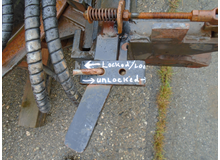Winter maintenance - Salting and Plowing Operations SWP

Summary:
This Safe Work Procedure applies when a City of Powell River worker is required to operate salt spreader/snow plow unit 325 or 326 to control ice or snow on City roadways and parking lots.
User must be trained on the equipment and procedures by a qualified operator
- Air brake endorsement required
- Use appropriate PPE
- Follow Working Alone Procedure as required
Hazards:
Slips and falls
- Entanglement
- Mobile equipment
- Flying debris
- Noise
Personal Protective Equipment (PPE) Required:
High-visibility clothing
- Safety footwear with adequate grip
- Gloves
- Hearing protection
Pre Set-Up:
- Do not perform these duties if fatigued or otherwise impaired.
- Follow Working Alone Procedure if no other workers are out.
- Perform and document pre-trip inspection on truck, spreader, and plows.
- Check that hopper has been properly emptied from previous shift - use caution and maintain three-point contact when climbing ladders.
- Make sure to unplug block heater.
- Be aware of the following hazards:
-entanglement with augers or spinner
-crush/pinch points with front and belly plows
-flying debris from spinner
- Keep hands, feet and clothing away from all power driven parts.
- Keep clear of the wire rope and spinner assembly if raising or lowering it.
- Plow Operator is to lubricate Salt Auger with grease gun prior once per shift
- If raising or lowering the spinner assembly, ensure that pawl on hand winch is in “reel out” or “reel in” position. If in “free spool” position, a firm grip must be maintained on the winch handle. Do not attempt to stop a spinning winch handle.
- Make certain that people are clear before starting or moving equipment.
- Test all attachments and controls for functionality prior to loading material.
- If using front plow, ensure that release pin is in lock position. Before use, drop plow and reverse truck briefly to ensure that plow is securely attached.

Task Procedure:
- Ensure load is secure - no large chunks of salt or sand on top of spreader screens.
- Worker must be trained to operate wheeled loader before loading materials into spreader.
- Do not overload spreader hopper.
- Always maintain three-point contact when using ladders to monitor or secure loads and equipment.
- Use headlights, beacons and spreader "wig-wag" lights when plowing or spreading.
- Driving conditions can deteriorate rapidly in winter weather. Drive accordingly and avoid sudden or extreme maneuvering and braking.
- Obey traffic laws – we are not exempt from them when performing winter road maintenance.
- Obey City of Powell River Personal Media/Communication Device Policy.
- Always wear your seat belt.
- Keep in regular contact with the other driver(s). Notify them and give location if getting out of the truck.
- Disengage hydraulics and set parking brake before leaving operators position.
- Maintain a safe distance from other vehicles and pedestrians.
- Evaluate your fitness and ability to operate safely throughout the shift. Take breaks as needed to avoid drowsiness and keep hydrated and nourished. If you feel that your are in any way impaired during a shift, you must stop performing these duties and contact your supervisor.
- Use caution when backing up – assess for obstacles and bystanders. Remember that the spinner assembly is low and set back from the rear of the truck, so can easily be damaged.
- Post-Procedure:
- Ensure that hopper is empty of material.
- Turn off all power before cleaning or servicing spreaders.
- Wash down the equipment during regular daytime work hours.
- Conduct and document post-trip inspection on truck, spreader, and plows. Report any deficiencies or safety concerns immediately.
